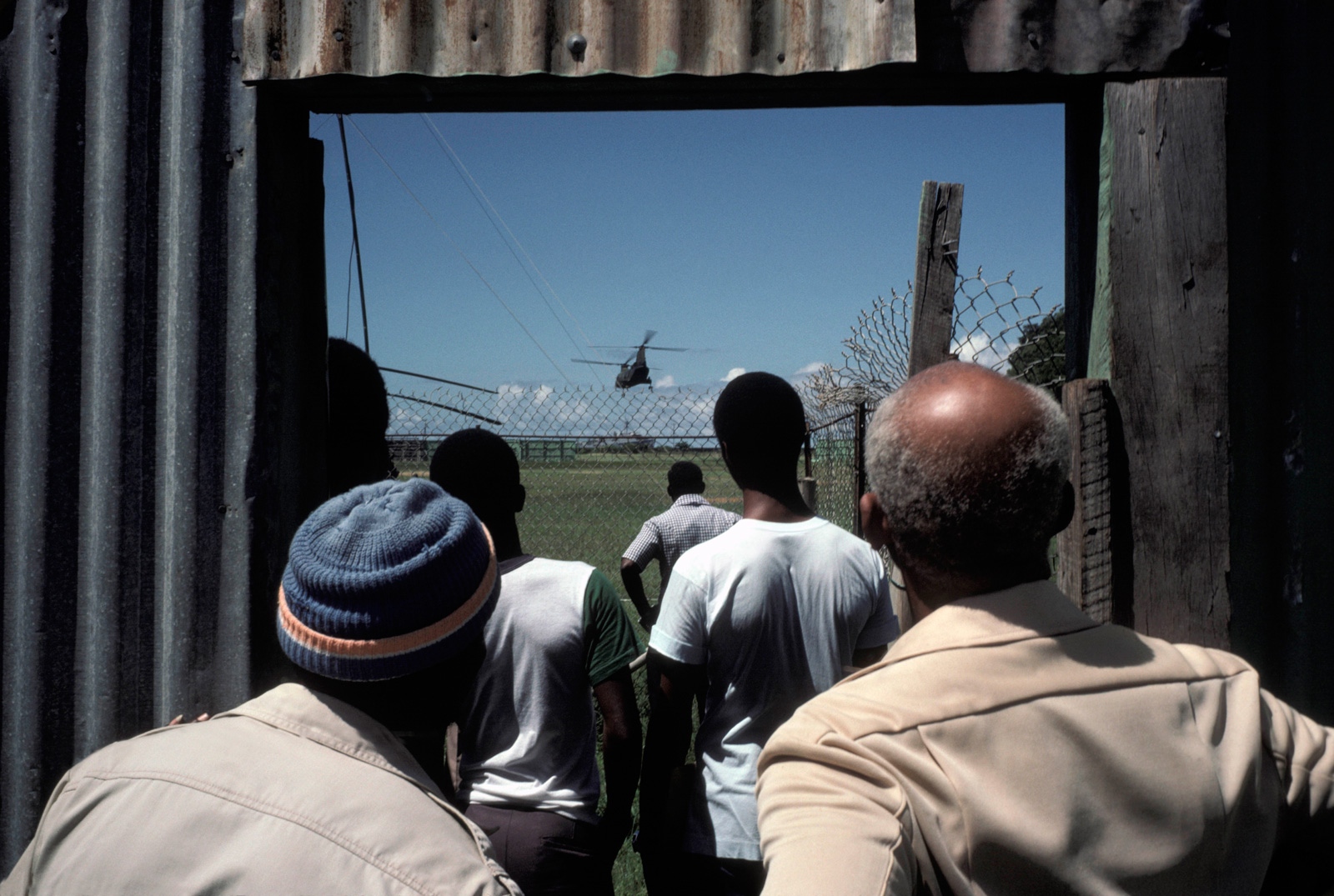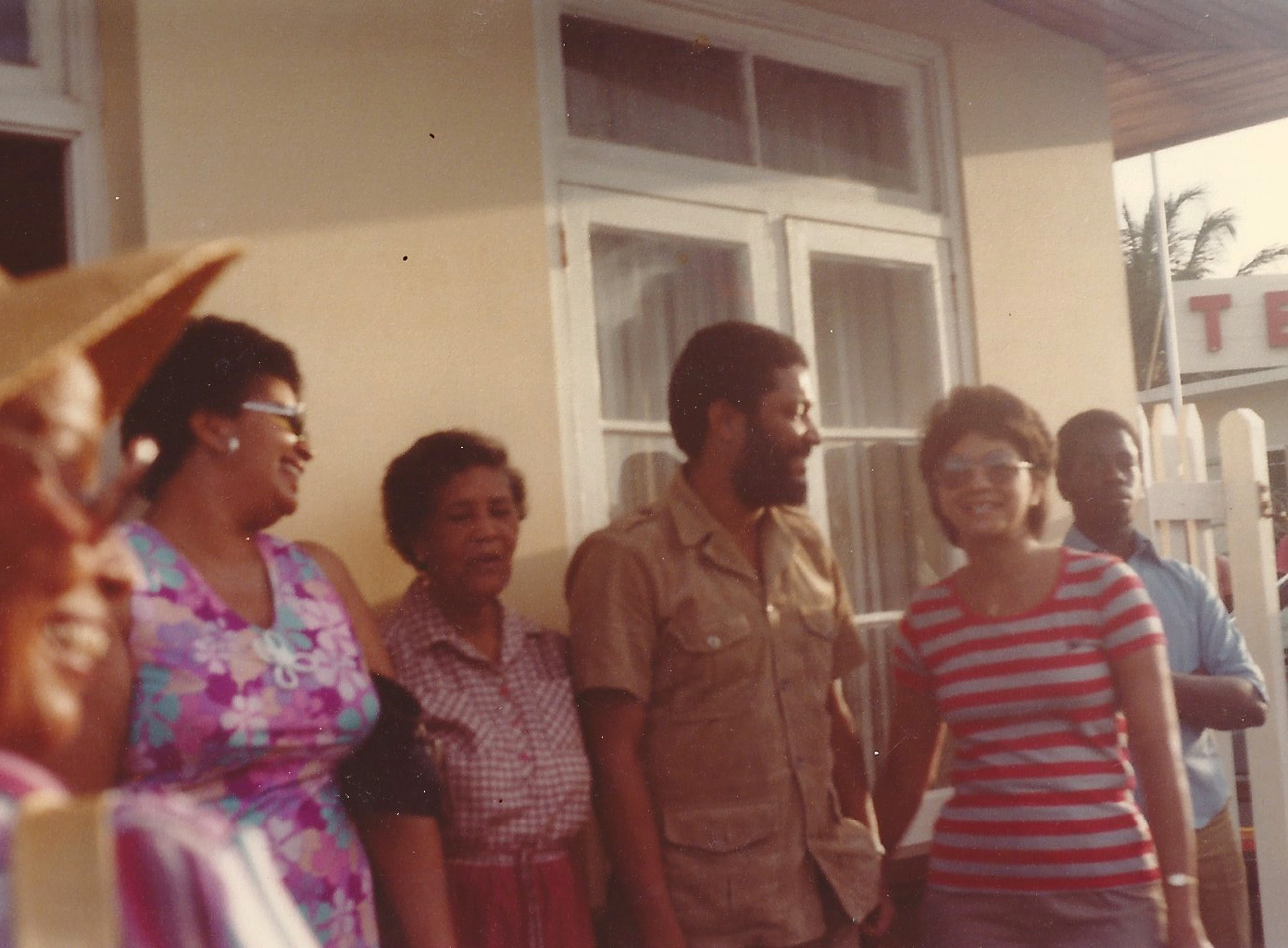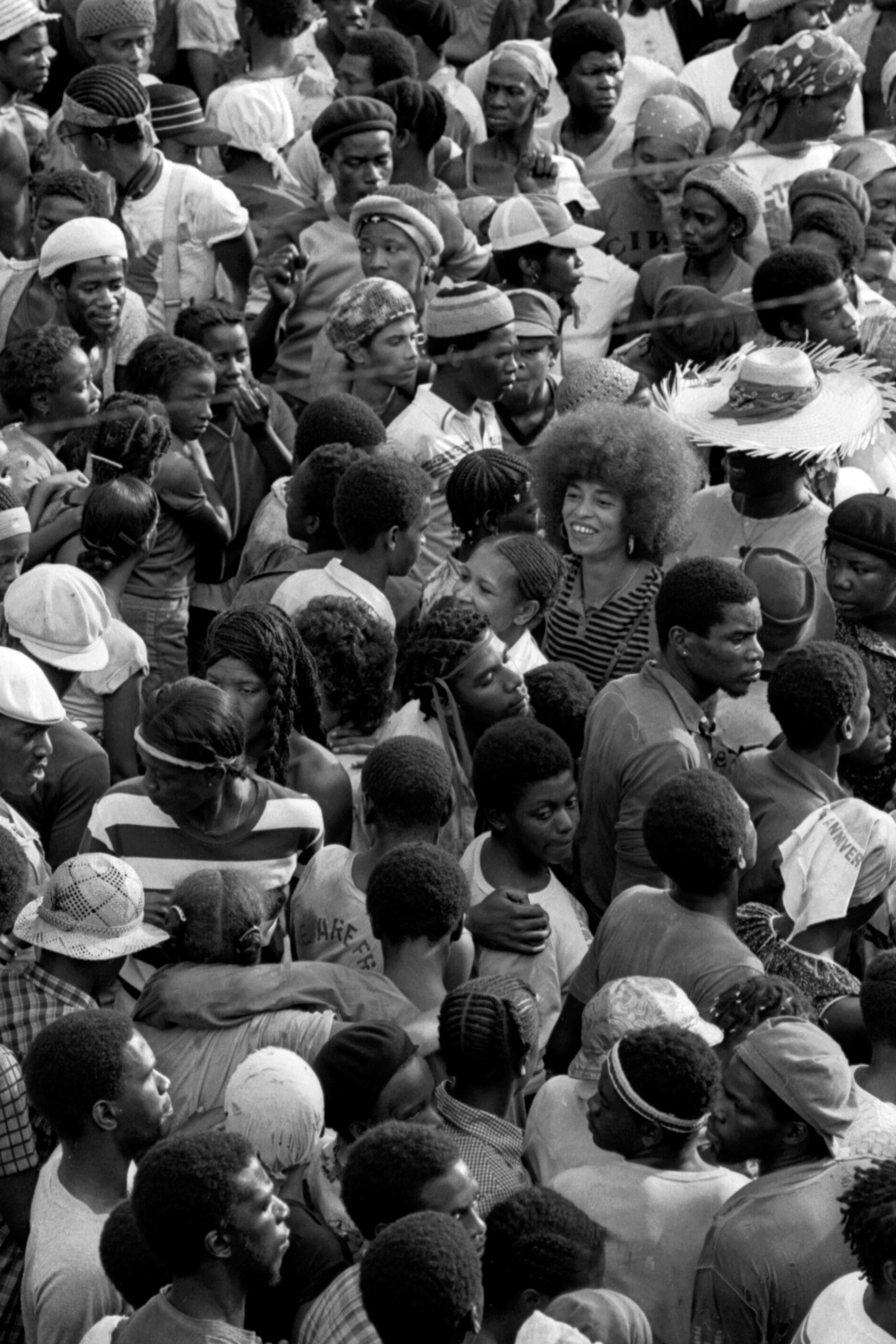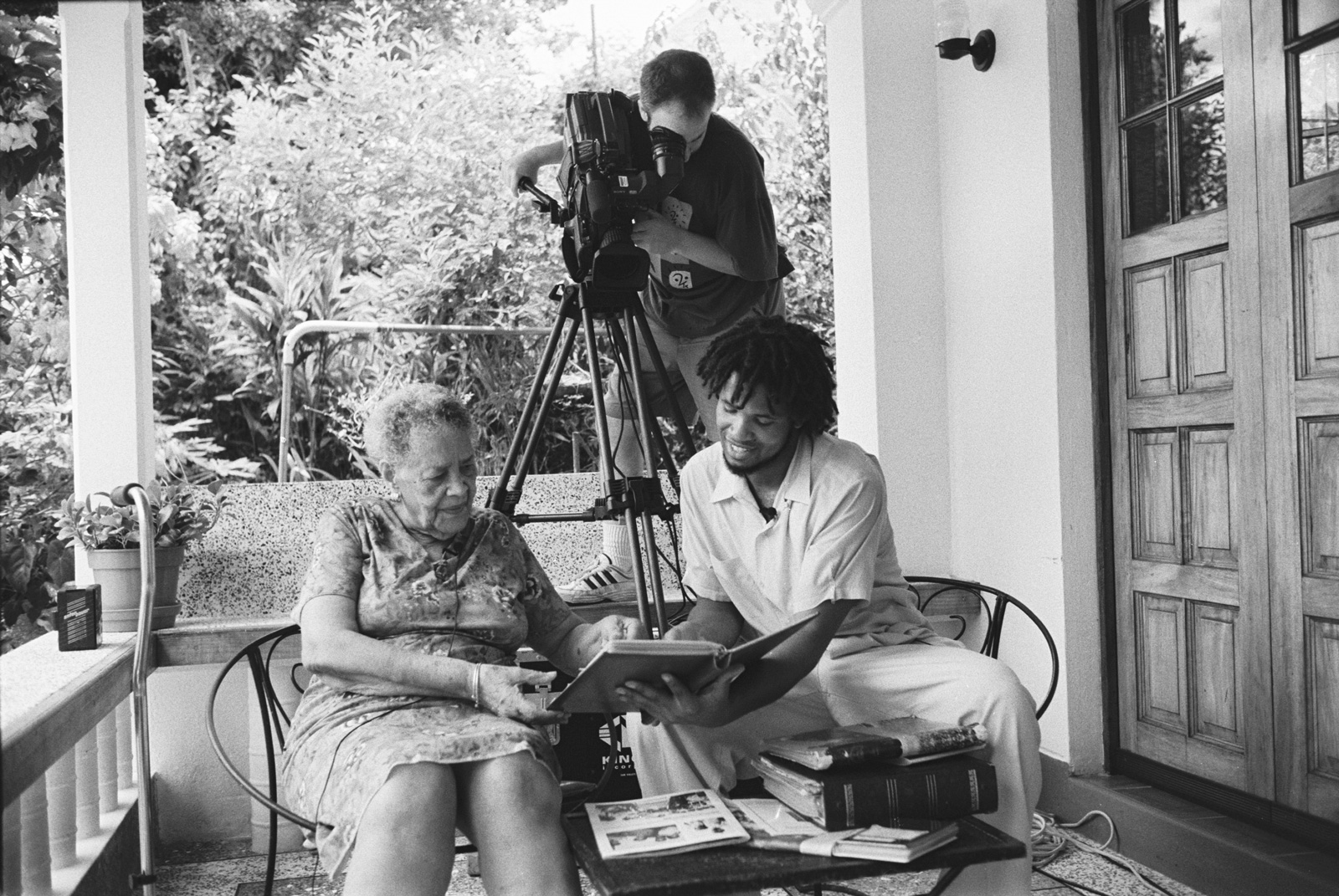In May 1801, Thomas Jefferson sent the Marines to Tripoli and Tunis to battle “Barbary pirates” who were menacing American merchants off the coast of North Africa, thereby launching the young United States’ first overseas military venture. Over the two centuries since, the list of foreign countries invaded by US forces has grown to include some 70 nations (not including the “first nations” on what became US territory itself). Some of these have become metonyms for their eras—Vietnam, Iraq. Most, though, dwell in Americans’ minds only as flickering features of news cycles from the past. One such is the small Caribbean nation of Grenada: an island that few Americans knew about before October 1983, when TV screens filled, for some days that fall, with images of paratroopers dropping between tropical palms.
Grenada is located at the base of the Windward Antilles, about one hundred miles off the coast of Venezuela, and is famed for its nutmeg. When Ronald Reagan ordered the 82nd Airborne there, he said the choppers bellowing over its beaches had come to safeguard several hundred American medical students from the civil unrest that had gripped the island after the apparent implosion, a few days before, of its government. Before 1983, Grenada was best known to West Indians for producing, along with its famous spice, the great calypso singer Mighty Sparrow. Afterward, it was known for the traumas left by this sad episode of the cold war whose legacy, for our current political era, is the subject of a welcome new documentary film, The House on Coco Road, directed by Damani Baker.
Reagan’s invasion, of course, had more to do with geopolitics than med students. Grenada had until that month been led by a charismatic and capable socialist, Maurice Bishop, whose admiration for Castro’s Cuba—and his acceptance of Cuba’s help to build a new airport for his island—bothered the US government. Reagan claimed that Bishop’s new airport—a project also backed by countries like Britain and Canada, and whose completion would enable jets carrying needed cargo and tourists to land there—was in fact meant to turn this tranquil island into “a Cuban-Soviet colony” and “a major military bastion to export terror and undermine democracy.” US soldiers had rehearsed the invasion for months on the US-Navy-held island of Vieques. Their actual landing there was quickly and roundly condemned at the UN as illegal, but Reagan was determined to maintain the Caribbean basin as an “American lake.” Sabotaging Grenada’s experiment at socialism, which had begun when Bishop’s party seized power in 1979, was an example he needed to make.
Invading Grenada worked out pretty well for the Gipper: Reagan won reelection in a landslide a year later, and would eventually see himself charitably recalled as a victor of the Cold War itself. But in the Caribbean, the one-sided battle in which US bombs killed dozens of innocents, and buried a political experiment that had inspired people across the region, is remembered rather differently.
In his film, Baker examines Grenada’s revolution through a highly personal perspective. Baker’s mother, Fannie Haughton, was an activist and educator in California who came of political age in the late 1960s amid the heady rise of the Black Panthers and the birth of university programs in Black Studies. She was a close confidante and comrade of Angela Davis, who also became, by the early 1980s, a mother concerned about rising crime in Oakland. After a trip to Grenada, Haughton impulsively decided to move her young family from the Bay Area to Bishop’s island. When they landed there her son Damani was ten years old. Thirty-four years later, Baker has made an absorbing film that’s framed as a record of his quest to understand, as an adult, what happened in Grenada—both in the life of his family and in the broader light of history.
Baker builds his story with grainy home movies of island life, and interviews with his mother and her friends (including Maurice Bishop’s winning mum). Their stories are supplemented by archival and news footage, and by Baker’s own narration as he visits sites in Grenada where Bishop’s New Jewel Party thrived. In 1983 Reagan’s bombs arrived to kill, among others, twenty-one patients in a nearby mental hospital. Baker and his sister took shelter under a bed for three days, until his mom got them off the island on a military plane that Reagan had sent to rescue those benighted med students in flip-flops.
This is the film’s climax. But to explain it, The House on Coco Road—which takes its title from Baker’s mother’s childhood home in Louisiana—reaches into the past. Baker recounts how his mother’s parents, seeking a safe place in which to raise black kids, fled southern racism for California in the 1950s. His ambition is to connect what happened in Grenada to the saga of African-American struggles for freedom reaching back to the toil of his sharecropper forebears in Dixie and forward to the Black Lives Matter movement today. This expansive approach has its hazards, and makes his film as much a personal tribute to the women who raised him as a historical narrative. But Baker’s intimate approach certainly lends human force to his rendering of Grenada’s revolution and its catastrophic end.
Advertisement
We see Ronald Reagan building a rhetorical case against the island and then proclaiming, after invading, “We got there just in time.” His words are jarring alongside footage of nothing more threatening than smiling people in the sun, a “popular education brigade” teaching peasants to read, and black women hailing Bishop’s declaration that henceforth in Grenada “equal pay for equal work” would be law. Reagan’s mien is also strikingly juxtaposed with that of an afro-ed Angela Davis, who is shown smiling in gap-toothed exultation as she visits Grenada in 1982. But among all of Baker’s revelatory footage, it is perhaps that of the Grenada revolution’s leader that most impresses.
Tall and striking, with an excellent beard, Bishop was an eloquent barrister who favored guayabera shirts and exuded the confidence of his London education. With his patient smile and light-brown skin, he was Fidel Castro with humility and Bob Marley without dreadlocks, as loved by Grenada’s peasants as by the academics and activists who crowded to his speeches in New York. His New Jewel movement (its name was an acronym: the New Joint Endeavor for Welfare, Education, and Liberation) was born in 1974. Its aim was to fight the corrupted regime of the man who’d become the island’s first prime minister, after the longtime British colony won its independence.
Eric Gairy was a petty despot who quashed dissent with a secret-police force whose slain victims included Maurice Bishop’s father. The younger Bishop’s party was at first forcibly repressed by Gairy’s police, then defeated at the ballot box in a dubious election, before its members took more drastic steps. One morning in 1979, while Gairy was away at the UN, Grenadians awoke to a smooth low voice on their radios: “Brothers and Sisters, this is Maurice Bishop.” That dawn, a few dozen New Jewel men had peacefully seized control of the island’s army barracks and its main radio station. “The dictator Gairy is gone,” Bishop intoned. “This revolution is for work, for food, for decent housing and health.”
And that—food, housing, health—is what his revolution fought for. A drowsy old sugar island whose slaves’ descendants were now mostly farmers and fisher-folk became vibrant with people crowding revolutionary rallies to dance and chant slogans that sounded like reggae songs and were affixed to brightly colored signs around the island: “Forward Ever, Backward Never”; “It takes a revolution, to make a solution”; “Not a second, without the people.” Their language may have been perfectly suited for V.S. Naipaul to ridicule, in an incisive but typically ungenerous appraisal of the “revo’s” shtick. But its aims meant rather more to the legion admirers of his movement, from the West Indies and beyond, who came to celebrate and support it. An early review of Baker’s film, recently quoted by Ava DuVernay (whose distribution company, Array Now, picked up Baker’s film) on Twitter, described Grenada in this period as “a functioning paradise for and by black people.” One of those black people was Damani Baker’s mother. And her personal backstory, which we learn as the film progresses, becomes important to how she—and her son’s film—narrates the Grenada revolution’s end.
The basic facts of what happened in Grenada, in the fateful weeks before the US invasion, are clear enough. That fall, the party’s central committee was struggling under the weight of all the projects their revolution had taken on, and debating how best to tackle them. Some of its members proposed that responsibility for the party’s leadership be split between Bishop and his erstwhile deputy, Bernard Coard. Bishop at first agreed. But then he went on a long-planned trip to Eastern Europe and, upon returning, informed his comrades that he no longer felt that power-sharing was in their revolution’s interest. They replied, with the help of the party’s security forces, by placing him under house arrest and announcing that Bernard Coard was now in charge.
Coard, though a devoted party man, was as uncharismatic as Bishop was loved; his wife, Phyllis Coard, although a prominent New Jewel minister, was also unpopular (perhaps mostly because she was Jamaican). A rumor spread that the Coards were planning to kill Bishop. Thousands took to the streets. Hundreds marched on Bishop’s house and succeeded in springing him loose, and bringing him to the island’s old colonial fort that overlooked St. George’s Bay. But soon soldiers arrived—the army had deposed Coard and declared itself in charge. Someone gave an order, or didn’t. Either way, Bishop and eight loyal colleagues were lined up against a wall and shot by men who until a few days before had been under his command. Their bodies were never found.
Advertisement
This chaotic, violent finale has always been somewhat mysterious. In Grenada and on nearby islands, pedants and scholars have long been occupied with arguing over and apportioning blame for what happened. (These debates also occupied a more purely expository documentary about Grenada’s New Jewel years by the Trinidadian filmmaker Bruce Paddington, called Forward Ever: The Killing of a Revolution.) Baker, for his part, doesn’t get into these arguments. To him, the basic reason for what happened is clear. And it’s to be found not in Grenada but in 1969 in Los Angeles, where Angela Davis was fired by then-governor Reagan because of her membership in the Communist Party.
UCLA was also roiled that year by the killing on campus of two young members of the Black Panther Party by rival activists. It later emerged that these murders, which threw the Panthers’ local chapters into turmoil, were at least partly precipitated by COINTELPRO—the FBI’s illegal program to infiltrate and destabilize subversive groups. Agents had fostered conflict between the Panthers and their rivals by sending fake letters between them. And Baker, when it comes time to explain Grenada’s tragedy, essentially points to this example. He spent happy months as a boy playing in the yards of both Bishop and the Coards; he’d known both as fast friends of his mother. “Why,” he asks, “were two friends who’d built the revolution together now fighting?” He answers that question with a definition: “‘Destabilization’: to cause a government to be incapable of function. Done successfully, it can happen without a trace.”
The moment reveals how Baker’s intimacy with his story may hinder its recounting. He’s the son of a woman for whom the word “Grenada” means, above all, “a loss of friends, and the loss of a utopia.” As she reads a fond letter sent to her from Phyllis Coard in prison (both of the Coards, along with sixteen other people, were convicted of Bishop’s killing), it seems the possibility of actual discord between her friends is unthinkable. One understands this, emotionally—and knows, too, that Fannie Haughton is a woman with deep knowledge of the US government’s capacity for harming those it deems threats. It’s also no doubt true that the US executed an avid propaganda campaign against Bishop’s government, in the Caribbean and beyond, and that US agents sought and likely found other ways to unsettle its leadership. But neither of those truths mean that Grenada’s revolution wasn’t also beset by genuine internal tensions.
Naipaul had a point when he wrote that “the Revolution was a revolution of words”: painting slogans for “the people” is much easier than actually running their economy—especially when you’ve nationalized important industries like the nutmeg trade, as Bishop’s government did, with a plan for growth comprised largely of “making the new man and woman.” The revolution had to work out how to thrive, as its heady hero phase began to wane, and debates over how to do so weren’t simple. “The leadership had to rock back,” is how Selwyn Strachan, Bishop’s Minister of Mobilization and Labor at the time, recently explained it to me in Grenada. “To prioritize, analyze, and rationalize.” It was through those discussions that the party’s central committee reached a decision to divide the prime minister’s duties with the aim, as Strachan put it, “of marrying Maurice and Bernard’s respective strengths, and leaving their weaknesses behind.”
Strachan should know. He was a party stalwart as close to its leaders as anyone: when Bishop returned from his trip in October 1983, it was Strachan who went to pick up his friend at the airport, and whom Bishop first informed of his reservations about the power-sharing agreement. Strachan was later convicted for his putative part in Bishop’s ensuing death, and spent twenty-six years in prison. He’s now a dignified man with a salt-and-pepper beard who was only released, after years of appeals, in 2009 (Bernard Coard was released the same year). In 2015, I sat with Strachan on a porch near the troublesome tarmac that’s now named the Maurice Bishop International Airport, as he reflected on the missteps and triumphs of a small group of people who—surely facing huge pressure, not least from a superpower waiting to swoop in as soon as things went wrong—made errors and had disagreements of a sort quite understandable among people of good will. And Strachan was never more animated than when he insisted that—despite the pain of his friends’ deaths and despite his own decades in jail—he had no regrets: “The Revolution is the greatest thing that ever happened to this country.” His eyes flashed as he recounted how he and his colleagues raised the island’s literacy rate to 99 percent, and he argued that support for the revolution on his island has never waned. “A black revolution, in the West Indies. It was earth-shattering.”
The House on Coco Road concurs with this sentiment, and so did the theater in Brooklyn full of rapt and cheering Grenadians with whom I saw this affecting film. It’s also the sort of movie that you may leave, especially at this polarized moment, wishing that its director, rather than preaching to a choir, had tried a bit harder to prove his case to strangers and render this complex story with greater nuance.
But what’s inarguable is the mendacity behind Ronald Reagan’s treatment of this island’s people. And in that there are warnings for us all as a new performer-turned-president stalks the White House, perhaps hoping for a war that might boost his own agenda and image—and as he looks, frighteningly, at foes far more formidable than little Grenada.
The House on Coco Road, directed by Damani Baker, is playing in select theaters and streaming on Netflix.






